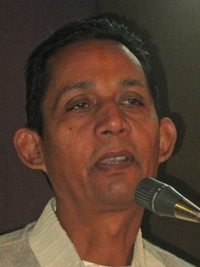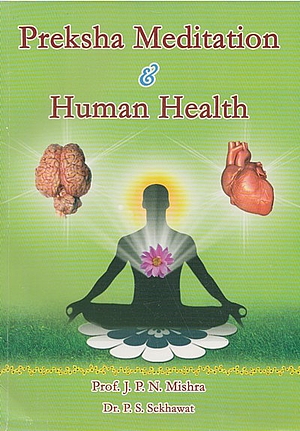Preksha Meditation module applied in the present study comprises Preksha Meditation as its main component. This module is a module where the practice of Preksha Meditation is at the core. It is presumed that whatever changes have been recorded during the whole duration of study appeared due to psychobiological efficacy of Preksha Meditation. It is relevant to mention here that the core and integral components of Preksha Meditation are Relaxation with Self Awareness (Kayotsarga), Perception of Breathing (Swas Preksha) and Perception of center of Enlightenment (Jyoti Kendra Preksha).
Relaxation is practised to counteract the ill effects of stress. Stress would mean deformation of our comforts. It can display itself as tightness, an anxiety or an irrational fear. Under stress we feel irritable, getting easily upset or angry and as stress increases we may begin to feel that we simply cannot cope with the situation any more, and finally that leads to several diseases or disorders, cardiovascular being one of them. Whenever one encounters a psychological stressful situation, an elaborate innate mechanism is automatically put into action. This mechanism involves
- hypothalamus - the remarkable portion of the brain which integrates all functions of the body which are not normally controlled by the conscious mind,
- pituitary gland, which is called master of the endocrine system because it regulates the other glands,
- adrenal gland, which secretes adrenalin and other hormones to keep the body tense and alert, and
- sympathetic component of the autonomic nervous system which is responsible for ultimately preparing the body for "fight or flight" response.
There is plenty of evidence now to show that tension may play a significant part in promoting or triggering off a great many illness including coronary heart disease and diabetes (Mahaprajna, 1992). There is an innate mechanism which produces physiological conditions, which are diametrically opposite to fight or flight response.
Nobel Laureate, Swiss Physiologist Dr. Walter described his response as a protective mechanism against overstress, promoting restorative processes and called it "trophotropic response". Dr. Herbert Benson (1975) has termed this reaction as "relxation response". Kayotsarga component of Preksha Meditation enable the practitioner to activate the healing mechanism and to influence our reaction to stress. It normalises the metabolic rate and secretion of stimulating hormones and the sympathetic dominance is being counter-balanced by increased parasympathetic activity (Muni Mahendra Kumar, 1991 and Mishra, 1996). Autosuggestion, associated with relaxation, works as a special kind of self- hypnosis which modulates the functioning of self-healing mechanism, thereby correcting the abnormal functions of various organs.
Perception of Breathing promotes the means of disposing the waste carbon dioxide and provides a continual replenishment of the oxygen, which thereby maintains the optimal level of metabolism. Balanced metabolism helps innate correction mechanism to operate in full swing. Constituent organs of nervous system and endocrine gland system constitute the psychic centers. These two systems are the two major controlling and coordinating systems of our body. They coordinate the work of other systems and through them control the functions of the body as a whole. The functional interlocking between them qualifies them to be regarded as constituting a single integrated system called "neuroendocrine system". Perception of the constituent endocrine glands and neuronal junctions modifies the hormonal profile and neurotransmitter level which in turn regulates the total metabolism. This may be the possible beneficial mechanism operating in Preksha module.
Mind modulates the cellular activity via the autonomic nervous system which consists of there stages
- mind generated thoughts and neural imagery (neural impulses) in the frontal cortex
- these mind generated impulses are filtered through the state dependent memory, learning and emotional areas of the limbic-hypothalamic system, and transduced into the neurotransmitters that regulate the organs of the autonomic nervous system
- these neurotransmitters initiate the process of information transduction from the thoughts in mind to biochemical responses including metabolism of various macro nutrients e.g.- carbohydrates, protein and lipid, within the individual cells of the tissues and organs of the body (Achterberg, 1985 and Rossi, 1986).
Similar mechanism operates in case of endocrine system which regulates cellular metabolic functions, such as the rates of chemical reactions for metabolism. Virtually all the constituent organs (endocrine glands) of this system can be influenced by mind modulation process via the limbic-hypothalamic system. The pituitary gland at the base of brain is the "master gland" of the endocrine system. It sends out hormones as "messenger molecules" to regulate all the other hormone-producing organs of the body. The pituitary, in turn, is modulated by the limbic-hypothalamic system. This system is the major center for integrating the informations originating from within the brain (after contemplation) and also coming from outside through sensory organs, and then transducing the same to the Pituitary to organize the hormonal secretions of other glands. This may be another route of action of healing following Jyoti Kendra Preksha in the system of Preksha Meditation.
 Prof. J.P.N. Mishra
Prof. J.P.N. Mishra
